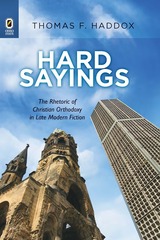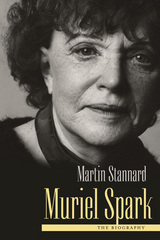2 books about Spark, Muriel

Hard Sayings
The Rhetoric of Christian Orthodoxy in Late Modern Fiction
Thomas F. Haddox
The Ohio State University Press, 2013
Hard Sayings: The Rhetoric of Christian Orthodoxy in Late Modern Fiction by Thomas F. Haddox examines the work of six avowedly Christian writers of fiction in the period from World War II to the present. This period is often characterized in western societies by such catchphrases as “postmodernism” and “secularization,” with the frequent implication that orthodox belief in the dogmas of Christianity has become untenable among educated readers. How, then, do we account for the continued existence of writers of self-consciously literary fiction who attempt to persuade readers of the truth, desirability, and utility of the dogmas of Christianity? Is it possible to take these writers’ efforts on their own terms and to understand and evaluate the rhetorical strategies that this kind of persuasion might entail?
Informed by the school of rhetorical narratology that includes such critics as Wayne Booth, James Phelan, and Richard Walsh, Hard Sayings offers fresh new readings of fictive works by Flannery O’Connor, Muriel Spark, John Updike, Walker Percy, Mary Gordon, and Marilynne Robinson. In its argument that orthodox Christianity, as represented in fiction, still has the power to persuade and to trouble, it contributes to ongoing debates about the nature and scope of modernity, postmodernity, and secularization.
[more]

Muriel Spark
The Biography
Martin Stannard
Northwestern University Press, 2011
Born in 1918 into a working-class Edinburgh family, Muriel Spark became the epitome of literary chic and one of the great writers of the twentieth century. Her autobiography, Curriculum Vitae: A Volume of Autobiography, recorded her early years but politely blurred her darker moments: troubled relations with her family, a terrifying period of hallucinations, and disastrous affairs with the men she loved. At the age of nineteen, Spark left Scotland to get married in southern Rhodesia, only to divorce and escape back to Britain in 1944. After converting to Catholicism in 1954, she began writing novels that propelled her into the literary stratosphere. These came to include Memento Mori, The Girls of Slender Means, and A Far Cry from Kensington.
Spark achieved international celebrity with The Prime of Miss Jean Brodie (1961), later adapted into a successful play and film. John Updike, Tennessee Williams, Evelyn Waugh, and Graham Greene, among others, applauded her work. She lived part-time in New York City, had an office at the New Yorker, and became friends with Shirley Hazzard and W. H. Auden. Spark ultimately settled in Italy, where for more than thirty years—until her death in 2006—she shared a house with the artist Penelope Jardine. Spark gave Martin Stannard full access to her papers. He interviewed her many times as well as speaking to her colleagues, friends, and family members. The result is an indelible portrait of one of the most significant and emotionally complicated writers of the twentieth century, full of strong feeling, sharp wit, and unabashed ambition.
Spark achieved international celebrity with The Prime of Miss Jean Brodie (1961), later adapted into a successful play and film. John Updike, Tennessee Williams, Evelyn Waugh, and Graham Greene, among others, applauded her work. She lived part-time in New York City, had an office at the New Yorker, and became friends with Shirley Hazzard and W. H. Auden. Spark ultimately settled in Italy, where for more than thirty years—until her death in 2006—she shared a house with the artist Penelope Jardine. Spark gave Martin Stannard full access to her papers. He interviewed her many times as well as speaking to her colleagues, friends, and family members. The result is an indelible portrait of one of the most significant and emotionally complicated writers of the twentieth century, full of strong feeling, sharp wit, and unabashed ambition.
[more]
READERS
Browse our collection.
PUBLISHERS
See BiblioVault's publisher services.
STUDENT SERVICES
Files for college accessibility offices.
UChicago Accessibility Resources
home | accessibility | search | about | contact us
BiblioVault ® 2001 - 2024
The University of Chicago Press









